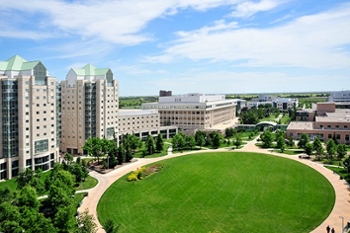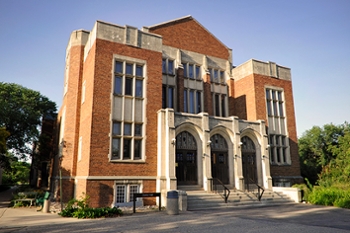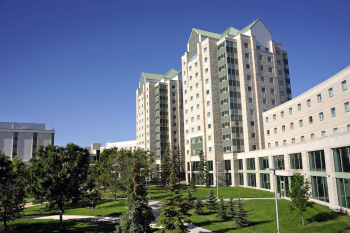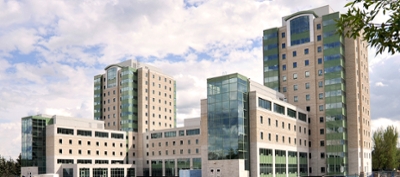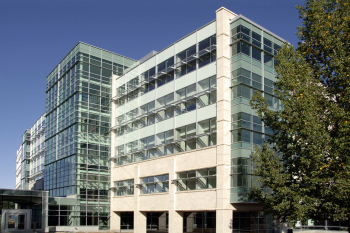University of Regina Profile
The University of Regina (U of R) has campuses located in Regina and Saskatoon on Treaty 4 and Treaty 6 territories. These are the ancestral lands of the nêhiyawak (nay-hi-yuh-wuk, Cree), Anihšināpēk (uh-nish-i-naa-payk, Saulteaux), Dakota, Lakota, Nakoda, and the homeland of the Métis/Michif Nation.
A comprehensive university, the U of R traces its roots back to the creation of Regina College, a small residential high school established by the Methodist church in 1911. The College grew in size and significance becoming a campus of the University of Saskatchewan and, ultimately, an independent degree granting university – the University of Regina – in 1974.
The U of R has:
- 10 faculties;
- 25 academic departments and schools;
- 10 institutional-level research centres and institutes; and,
- three federated colleges: Campion College, First Nations University of Canada, and Luther College.
Some programs are also delivered with partners including Saskatchewan Polytechnic, regional colleges, Gabriel Dumont Institute, and Yukon University.
In 2021, the University of Regina had over 16,000 full-time and part-time students. Our tuition rates are on par with the national average and the University is among the top comprehensive universities in the level of student financial support – scholarships, awards, and bursaries – available as a percentage of tuition.
In Regina, our main and historic College Avenue campuses are located on 239 acres in Wascana Park, one of the largest urban parks in North America, providing an attractive study and work environment for our students, faculty and staff. Both campuses are 100 per cent smoke-free as part of our commitment to providing a safe and healthy place in which to study, work, live, and visit.
|
|
|
Dr. Lloyd Barber Academic Green on main campus |
|
|
|
College Building at historic College Avenue campus (artist rendering) |
|
|
|
Darke Hall at historic College Avenue campus |
|
|
|
Paskwāw Tower and Wakpá Tower student residence |
|
|
|
Kīšik Towers student residence |
|
|
|
Research and Innovation Centre (RIC) |
Alumni
Our alumni – numbering more than 85,000 – contribute to and build our society in Saskatchewan and in Canada, and are our ambassadors to the world. Our history, our accomplishments, and our growth as a university stem from our commitment to working together for the good of our local and global communities.
2020-2025 Strategic Plan: All Our Relations, kahkiyaw kiwâhkômâkaninawak
The title of the University of Regina's 2020-2025 Strategic Plan, All Our Relations, is the English equivalent of a phrase familiar to most North American First Nations Peoples. It is often used to formally acknowledge the interconnectedness of family and all their relations including those that walk on two feet, those that walk on four feet, those that swim in the great waters, those that fly in the sky and those that crawl on their bellies.
Through the strategic plan, the University of Regina is committed to these five areas of focus and the specific goals related to each:
- Discovery
- Truth and Reconciliation
- Well-being and Belonging
- Environment and Climate Action
- Impact and Identity
Discovery
Discovery lays out the key aspects needed to bolster and strengthen the academic successes and careers of U of R students, faculty, and staff, as well as create impact within communities in Saskatchewan, Canada, and worldwide. It has three overarching objectives – Excellence in Teaching and Research, Student Success, and Internationalization.
Excellence in Teaching and Research
We teach and support students to think critically, to engage in ethical reasoning, to understand their worlds and the worlds of others, and to actively contribute to the betterment of society.
A diverse and inclusive environment assists in attracting and retaining teachers and researchers to the University’s faculties and units. It builds on the U of R’s existing areas of national expertise, such as the Child Trauma Research Centre (CTRC), the Canadian Institute for Public Safety and Research Treatment (CIPSRT), the Clean Energy Technology Research Institute (CETRI), and the Institute for Energy, Environment and Sustainable Communities (IEESC), while seeking opportunities for new collaboration with other academics and institutions globally.
Beyond the classroom – in fieldwork, internships, performances, and academic exchanges – our focus on experiential learning creates new opportunities for discovery and better prepares students for life and work, adding to Saskatchewan’s economy and contributing to building a better quality of life for people and communities.
The University of Regina is home to a diverse research community that includes faculty members, graduate and undergraduate students, post-doctoral fellows, and several research chairs. Ten institutional-level research centres and institutes and numerous faculty-operated centres support research collaboration and partnerships focused on our research strengths.
Indigenous research is a growing focus as we encourage and support Indigenous ways of knowing. Several centres and institutes reflect this in their projects and partnerships.
With $31.4 million in research revenue in 2020-21, the University of Regina has emerged as a centre of excellence on a number of research fronts. Our four signature research areas are based upon research impact, critical mass of highly qualified personnel, distinctiveness, and commitment to partners in the community and the Province of Saskatchewan.
The University of Regina was named the 2020 Research University of the Year in the undergraduate university category by Research Infosource, a leading source of ranking information on research and development in Canada. Based on six different categories, the designation is awarded to the university that demonstrates superior performance on key measures of research success.
Student Success
University of Regina graduates experience the best employment outcomes of all post-secondary graduates in Saskatchewan. We are leaders in the critical area of experiential learning, and our graduates leave our campus prepared to succeed in the world. In 1969 we pioneered the first co-operative education program in Western Canada and we now offer the Co-operative Education & Internships Program in more than 50 programs in the Faculties of Arts, Business Administration, Engineering and Applied Science, and Science.
Experiential learning components in our degree programs result in our co-operative education students earning approximately $10 million in wages per year. Over the last decade, co-op job placements and internships have grown by 60 per cent, as we continue to develop career-ready graduates and connect students with potential employers.
In Fall 2022, the University will open the Centre for Experiential and Service Learning, giving students new opportunities to gain experience in both paid and volunteer positions, resulting in career-ready graduates who find work fast.
Internationalization
One of the key strengths of the University of Regina is the growth in enrolment of international students in recent years. In 2021, international students comprised 17.1 per cent of total students.
These students bring diversity and different worldviews and perspectives that add to the strength of our University and community. In many cases, international students end up moving to Saskatchewan permanently, supporting the growth of our province and economy.
In addition to bringing the world to our campus, we work with community stakeholders, government organizations and funding agencies at home and abroad and partner with academic institutions globally to collaborate on teaching, research, and community-development.
In 2021, the University had 309 international institutional agreements with 44 countries facilitating opportunities for student mobility, research, and faculty mobility. Our international reach continues to extend outwards with positive results.
Truth and Reconciliation
The University of Regina’s commitment to Truth and Reconciliation is the second of five interconnected areas of focus in our 2020-2025 Strategic Plan.
Over the past decade, the University of Regina has witnessed the steady growth of students self-declaring as Indigenous – now making up 15.3 per cent of the U of R’s student population.
Institutional changes at the University—while still ongoing—have made the campus more attractive to Indigenous students. This includes initiatives such as the ta-tawâw Student Centre, nitôncipâmin omâ Student Success Program (The OMA Program), Indigenous Social Work and Education programs, the Indigenous Advisory Circle, among others. In June 2021, the University welcomed our first Associate Vice-President (Indigenous Engagement).
Well-being and Belonging
Well-being and Belonging relates to three interconnected objectives:
- Equity, Diversity, and Inclusion (EDI)
- Healthy Living
- Mental Health Literacy and Research
By taking this holistic approach, the Strategic Plan highlights the importance of belonging and the many facets of well-being to the success of students, staff, and faculty.
Current and planned initiatives supporting well-being and belonging include:
- The EDI-AO Action Plan. Equity, Diversity, Inclusion and Anti-oppression embodies honouring who we are, where we are, where we have been, and where we are going. The EDI-AO Action Plan establishes the foundation for shaping the institutional culture to one that integrates EDI considerations into decision making, teaching, research, and learning. Effective EDI requires openness and acknowledgment of the lived experiences of students, faculty, staff and our greater community.
- Venues such as the Centre for Health, Wellness & Performance, which extends our impact beyond the University and into communities throughout Saskatchewan.
- The first nurse practitioner-led Student Wellness Centre at a Canadian university, opened in October 2021 to provide primary health-care services to U of R students.
- A Mental Wellness Hub launched in September 2020, which plays a pivotal role in achieving our objectives of providing internal and external resources for the education, training, and mental health literacy for our students, faculty, and staff. The Hub is one part of the University’s overarching Mental Health Strategy and is designed to educate, inform, and foster collaboration of mental well-being initiatives, services, and resources.
- A commitment to prioritizing and supporting mental health research to improve the lives of people in Saskatchewan and throughout the country. This work includes the Online Therapy Unit and institutes such as the Canadian Institute for Public Safety Research and Treatment and the Child Trauma Research Centre, making the University a national leader in mental health literacy and innovation, and creating a strong healthy workforce and communities.
Environment and Climate Action
Environment and Climate Action – the fourth area of focus in our 2020-25 Strategic Plan – provides a framework for how the University will strengthen its connection with, and protection of, the environment and our climate through three major objectives:
- reduce greenhouse gas (GHG) emissions
- develop the University of Regina as a Living Lab
- decrease the production of waste and consumption of water
Each objective is framed by the overarching goal to reduce the University’s ecological footprint by 25 per cent.
To help guide this cultural and operational shift, Fall 2022 will see the launch of two important initiatives: unveiling of a new multi-year Sustainability Action Plan, and establishment of a new Sustainability Office.
To date, the University supports three Canada Research Chairs focusing on various aspects of clean energy development, water security, the environment, and climate change.
This area of focus also supports and builds on the University’s success at progressive energy management. Over the 2009 to 2019 period, the University reduced total electrical consumption by 13 per cent and reduced per square foot electrical consumption by 22 per cent. This accomplishment, alongside our waste, water, and transportation initiatives, led the University to win the 2022 Regina & District Chamber of Commerce Paragon Business Excellence Award for Environmental Excellence.
Impact and Identity
Impact and Identity - the fifth area of focus – recognizes that the connections of our students, faculty, and staff with all of our stakeholders are key components of our ability to positively influence and impact society. We are committed to forging reciprocal relationships that generate interest in, and increase the societal relevance of our academic efforts.
We seek to enhance our institutional identity by valuing our alumni and their accomplishments; supporting and developing our research strengths and reputation; and celebrating our impacts and unique characteristics.
Programs
We offer more than 190 undergraduate programs and 80 graduate programs, including many specialized programs such as police studies and public policy.
- Our Faculty of Engineering and Applied Science offers five interdisciplinary, systems-based undergraduate programs, all fully accredited by the Canadian Engineering Accreditation Board.
- Our Faculty of Arts, with 13 departments, 43 undergraduate programs, a range of graduate programs, six research centres, institutes, and 12 labs, is one of the University of Regina's largest faculties in terms of student enrolment, the largest in terms of credit hours and number of tenure-stream faculty, and is the most disciplinarily diverse.
- Regina’s first bilingual studies centre opened on the university campus in September 1968. More than 50 years later, La Cité universitaire francophone and the Bac en éducation française program (Le Bac) proudly represent the Francophonie at the University of Regina. It is an educational, research and sociocultural hub where French flourishes. La Cité works collaboratively with several partners to expand opportunities for university education in French in Saskatchewan. La Cité offers a wide range of undergraduate and graduate programs in French and intercultural studies, nursing, law, minors, certificates and non-credit programs in French as a second language that help build capacity and expertise in the Francophone community and meet the bilingual educational aspirations of all levels of learners.
- We value inclusive education and provide programs and initiatives that support this goal such as the Certificate of Extended Studies in Inclusive Education, which enhances knowledge and expertise in fostering an inclusive classroom, and Campus for All, an inclusive post-secondary education (IPSE) initiative for adults experiencing intellectual disability.
- The University of Regina supports inclusion and diversity through programs such as the Colourful Campus House, a housing option specifically for 2SLGBTQIAP+ students in the College West residence. Also in College West, the multipurpose lounge on the fourth floor features special ventilation so the space can be used for smudging, ensuring Indigenous students can practice their culture freely and build a sense of belonging. Special ventilation for smudging is also in Kīšik Towers.
- The Saskatchewan Collaborative Bachelor of Science in Nursing Program (SCBScN) is offered jointly with Saskatchewan Polytechnic, and admits 407 students a year. The four-year nursing degree program responds to the needs of the province. Course delivery methods include in-person, online, and hybrid teaching methods. In-person classes are in Regina and Saskatoon, with clinical experiences taking place throughout the province. Bilingual students may choose to take up to 50 per cent of their classes in French. This is the only bilingual nursing option in the province that will result in students receiving a Bachelor of Science of Nursing Degree with a bilingual notation on the student's transcript. There is also a Master of Nursing with a nurse practitioner option in the Collaborative Nurse Practitioner Program (CNPP). The Faculty of Nursing also supports a number of special case PhD students.
- We are the first Canadian university to offer a Bachelor of Arts degree in Police Studies. The program has resulted in important partnerships with police services in the province and beyond.
- Our innovative interdisciplinary degree programs include Creative Technologies interdisciplinary program, based in the. The program brings together artists, scientists, and cultural theorists. Students can choose from courses in engineering, computer science, and fine arts, such as new media, film production, animation and software design. The Philosophy, Politics and Economics (PPE) undergraduate program draws upon three disciplines to examine today’s global challenges from a broad-based perspective.
Campus Growth
University of Regina campus growth builds on our history and commitment to academic and research excellence, student life, culture, and sustainability.
- Historic Darke Hall re-opened in May 2022 under the leadership of the Darke Hall Society, a non-profit community group which operates the venue. Originally constructed in 1929, it is a fully-accessible, 475-seat theatre in Regina. It is a cultural hub and performance space for select Conservatory of Performing Arts and Music department recitals and events.
- The Research and Innovation Centre received national attention from the Royal Architectural Institute of Canada when it was profiled as an example of excellence in functional design in Award, the Magazine of Sustainable Architecture, Construction and Design.
- The College Avenue Campus Renewal Project – the revitalization of the architecturally and culturally significant buildings on College Avenue – also received attention for preserving Regina’s history while refurbishing a vibrant centre of learning, research and culture in the heart of downtown Regina. In August 2018, through the generous support of donors, the renewed College Building re-opened its doors to students and the community with the completion of phase one of the project. The $63.6 million restoration preserved numerous heritage elements while improving safety, accessibility, and sustainability.
- Also in August 2018, the first University of Regina residence – College West – was re-opened following a major renovation to upgrade the 45-year-old building into modern, safe, inclusive, bright, and accessible housing for 274 students. The U of R’s College West, Kīšik, Paskwāw and Wakpá towers are now able to accommodate 1,575 students in on-campus housing.
Growing Our Community and Building Our Province
The University helps create capacity for social, cultural and economic development, and has long been recognized as an economic driver in the local and provincial economy in multiple ways:
- The University’s operating budget for the 2022-23 fiscal year is $248.7 million.
- We attract thousands of students to our University from other cities, provinces and countries every year. Many continue to live in Regina or elsewhere in Saskatchewan after graduation, making ongoing contributions to our society in their careers, families, and communities.
- We employ approximately 3,000 individuals in academic and staff positions. This does not include employees of the three federated colleges: Campion, First Nations University of Canada, and Luther College which manage their staffing processes separately.
- Our community reach is further extended through the College Avenue campus – home to the University’s Centre for Continuing Education (CCE). CCE delivers hundreds of continuing education courses and facilitates over 30,000 enrolments every year. Thirty per cent of all credit courses at the University of Regina are run through CCE in partnership with the faculties. CCE has a strong outreach centre and is home to the Lifelong Learning Centre and the Conservatory of Performing Arts offering programming for learners of all ages. CCE also operates the English as a Second Language program, offering language and cultural programs to students from 26 different countries.
Updated: July 12, 2022


